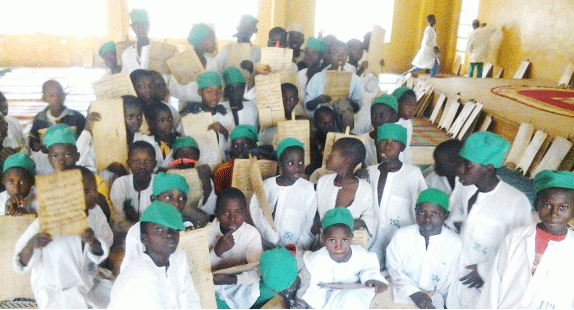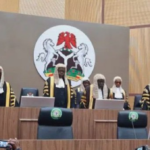
Last quarter, this Column did a series on the social malaise of Almajiri. Now that political leaders are discussing Restructuring, one thought they would address this matter. Alas! So, in order to keep it on the front burner ‘until something gives’ in sha Allah, we today present perspective of the Judiciary on this social crisis. An intellectual among the learned, Justice Musa Danladi Abubakar of the Katsina State High Court, recently delivered a paper titled “Children in Need of Care and Protection Under Islamic Law: The Almajiri Experience” to his colleagues at the 18th Annual Judges’ Conference of the Centre for Islamic Legal Studies, Ahmadu Bello University, Zaria. Excerpts:
The Almajiri phenomenon is a serious social problem of national magnitude. Many attempts at reform have been made in the past but they remained largely academic. The Justice process should not close its eyes to the reality of the problems, particularly looking at it from the perspective of reformation rather than punitive. Judges are social engineers that must ensure the preservation of social structures. Unless the issue is given the serious attention it deserves, we may in not a very long time have its time-bomb explode.
Current statistics puts the number of out of school children in Nigeria at over 13 million, out of which the Almajirai constitute of about 10 million according to statistics of the National Council for the Welfare of the Destitute (NCWD) in 2016. One can imagine ten million potential judges, accountants, engineers etc., being wasted. The Almajiri system as being practiced presently has really outlived its usefulness.
The bastardisation of the Almajiri System started with the conquest of the Sokoto Caliphate. The introduction of Western education, though vehemently resisted initially, had a devastating effect on the Almajiri system which the colonialists termed as ‘religious schools’ that should not attract state funding, while ‘Boko’ was being funded by the state. Without any financial support from the treasury, there could neither be control nor supervision of the Almajiri system, and thus the gradual destruction of the system set in.
In the pre-colonial era, the system was jointly run and funded by parents, members of the community and state treasury through Zakkat, and was fairly regulated under the control of the Emirs. As part of their moral training and character building, the Almajiris contributed in farming for the Mallam and the community. While undergoing tutelage, the Almajirai engaged in learning some vocational and occupational skills.
Today, with no financial support to undertake effective teaching and learning resorted to begging and other menial jobs for survival. This situation continues to degenerate and is certainly the root cause of what is known as the Almajiri system today.
The Almajiris aged between four and 15 years are today engaged more in seeking sustenance than in learning the Qur’an. They move around in a pitiful sight, sickly and unhygienic. Their ages are the formative period when they need love, care and affection the most. Apart from being inherently vulnerable at their ages, the Almajiri in this circumstance becomes more exposed to being exploited and abused and begins to indulge in anti-social habits that could graduate them into more serious crimes.
The Almajiri has become easy prey for the unscrupulous politicians to engage in political thuggery, and is prominent in sectarian/religious violence and may end up as recruit of extremist religious and militant groups. He today represents the symbol of irresponsible parents, insensitive authority and uncaring community. He falls into the category of the easily-exploited and abused child that easily gets into conflict with the law.
Islamic Law has provisions for dealing with young offenders who have not reached the age of criminal responsibility (Taklif). Various legislations have provided for dealing with children and young offenders that come into conflict with the law. The objective of any penal punishment on children and young persons is essentially reformative.
The current trend in Child Justice Administration (CJA) and the negative consequences arising therefrom should be a source of concern to Judicial Officers. Policy makers can make the best policies, lawmakers can enact the best laws and international agencies could provide the best funding, yet the fact remains that it is only Judges that could make the reforms work.
Judicial process on children and young offenders must be anchored on the recognition of the rights of the child to survival, growth, protection and positive participation in the society. Judges must shift from the philosophy of punishment and deterrence to preventive, corrective and advocacy-oriented approaches. The central context relative to children in conflict with the law relates to the fact that due to their age and immaturity, children deserve separate and different treatment from their adult counterparts in the criminal justice process.
Due to the vulnerability and limited capacity of children who are still in a formative stage of development, any action to be taken in the judicial process, should in addition to being in the best interest of the child, be responsive to the child’s care and development needs in order to ensure that juvenile offenders are reintegrated back into their communities as law-abiding citizens. The trial process should focus not only on the nature of the offence committed, but on the root causes, background and the individual circumstances of the child involved.
In sentencing children and young persons convicted by the courts, recourse should be had to Diversion which involves the channeling of certain cases away from the criminal justice system, usually on certain conditions. Diversion is one of discretions that a judge could employ in place of incarceration and custodial measures and which facilitate faster reintegration of the juvenile offender.
Diversion is usually premised on an acknowledgement of responsibility for the offence, an agreement to make amends for the crime by performing community service or compensating the victim, and attendance at reform programmes such as life skill acquisition, drug reduction, sexual offences and anger management.
The main advantages of Diversion over imprisonment in Child Justice Administration are that it protects the child from getting a criminal record and being branded at an early age; it prevents the child from being stigmatised; it minimises deprivation of the child’s liberty and avoids the risk of contact with more hardened criminals; it quickens the process of reform, deterrence and reintegration.
I will conclude with the words of late Mother Theresa of India when she said; “The biggest disease today is not leprosy, tuberculosis or AIDS, but the feeling of being unwanted.” This is the situation the Almajirai are in today. The challenge is on all to ensure adequate and proper care, protection and good upbringing of children, for they are our hope and the hope of our tomorrow.
TANKO YAKASAI ANNUAL COMMEMORATIVE LECTURE: Last week here in Kano, the first in a series of Annual Commemorative Lectures was held to celebrate the life of Alhaji Tanko Yakasai, veteran leftist politician who is now 92. Back in 2015, Alhaji Tanko was not the darling of many people, because he went against the trend then trending. But today, after some years of another round of JIKI MAGAYI, Kano political elite turned up to celebrate him. According to his wife, Hajiya Rabi, one favour Allah has bestowed on Alhaji Tanko is that he is rarely ill, but on the other hand she spent most of her young life in the 1950s and 1960s visiting prisons where her husband and his NEPU colleagues were incarcerated.
ADIEU, MAHMOON BABA-AHMED: Our senior colleague and Columnist on Aminiya, sister of this newspaper, died a couple of nights ago. May Allah forgive Mahmoon’s faults and admit him to Janna. This Columnist’s condolences go to especially his immediate family, and to his brother Dr. Hakeem Baba-Ahmed.



